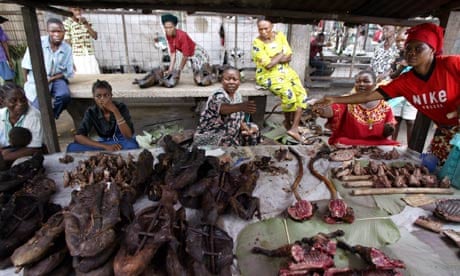Several tonnes of illegal "bushmeat" from animals ranging from primates to crocodiles are being smuggled in luggage each week through one of Europe's busiest airports, researchers said today.
Animal experts worked with customs officials at Paris's Charles de Gaulle airport to identify meat from species being carried into Europe from central and west Africa.
Over a period of 17 days, 134 passengers from 29 flights were searched and almost half were found to be carrying fish or meat from livestock or wild animals.
The researchers found 11 different "bushmeat" or meat from wild animal species including Nile crocodiles, red river hog, primates, porcupines and pangolins.
The probe found two-fifths (39%) of the wild species smuggled in were subject to trade regulations under the Convention on International Trade in Endangered Species (Cites).
Livestock including entire sheep and calves wrapped in plastic and placed in holdalls were also uncovered during the research.
The experts from the Zoological Society of London (ZSL), the Royal Veterinary College (RVC), the National Veterinary School and the Natural History Museum of Toulouse estimate some five tonnes of bushmeat pass through the airport in personal luggage each week.
Smuggling meat in luggage such as holdalls poses a major risk to human health and could spread disease, while the bushmeat trade also poses a threat to wildlife, they warned.
Dr Anne-Lise Chaber, from ZSL and the RVC, said: "Our results estimate that around 270 tonnes of potentially contaminated illegal bushmeat is passing unchecked through a single European airport per year, posing a huge potential risk to potential public health."
And the study, which is published today in the journal Conservation Letters, said the nature of the imports suggested there was a growing luxury market for the meat and it was being brought in for trade and not simply personal consumption.
Co-author Dr Marcus Rowcliffe, from ZSL, said: "Our results show that this is a lucrative, organised trade feeding into a luxury market; a 4kg monkey will cost around €100 (£84) in France, compared with just €5 (£4) in Cameroon.
"Importing bushmeat is relatively easy, as customs officials are given no financial incentives to uncover illegal meat imports, compared with the bonuses they're awarded for drug and counterfeit seizures.
"Also, penalties are very low for people caught carrying illegal meat."

Comments (…)
Sign in or create your Guardian account to join the discussion